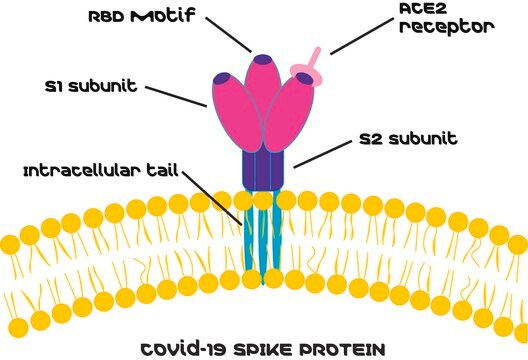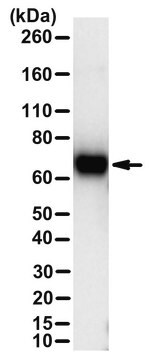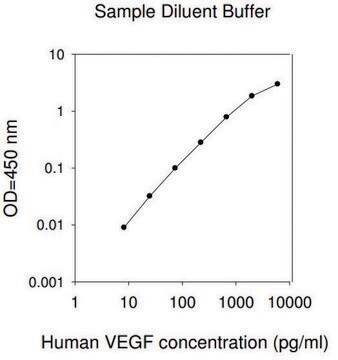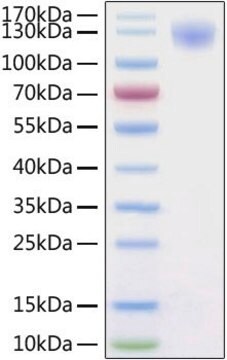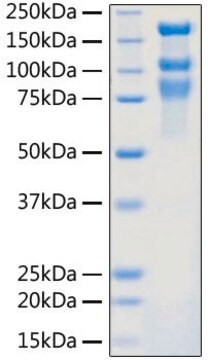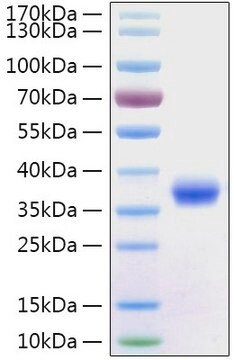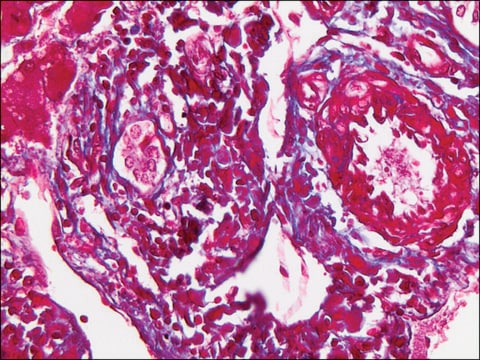Allgemeine Beschreibung
Severe Acute Respiratory Syndrome Coronavirus 2 (SARS-CoV-2) or (2019-nCoV) is a novel coronavirus that emerged in December 2019 and since then has infected millions of people worldwide.1 The Spike protein (also known as S protein) is the most studied of the coronaviruses proteins, since it contains the Receptor-Binding-Domain (RBD) for the ligand on the host cell membrane (the ACE2 protein), and also has epitopes recognized by T and B cells
Spezifität
SARS-COV-2-Spike-RBD epitope (370-394) is a synthetic peptide corresponding to the amino acid sequence of Spike RBD region (GeneID: QHD43416.1) in positions 370-394.Peptides derived from the SARS-COV-2-Spike-RBD protein can be recognized by anti-SARS-CoV-2-Spike protein antibodies.
Immunogen
S370-394: nsasfstfkcygvsptklndlcftn
Anwendung
The peptide may be used in various immunochemical techniques including Immunoblotting and Elisa.
Biochem./physiol. Wirkung
The Spike protein (also known as S protein) is a type I trimeric glycoprotein that is presented on the virion membrane, giving it the appearance of a crown. The protein has two subunits: S1, or bulb, that contains the RBD3-10; and S2, or stalk, responsible for the fusion of the virion with the host cell membrane. The main receptor for SARS-CoV and SARS-CoV-2 on the membrane of the target cells is the Angiotensin 2 Converting Enzyme (ACE2), a metallopeptidase present on the membrane of many cells, including type-I and -II pneumocytes, small intestine enterocytes, kidney proximal tubules cells, the endothelial cells of arteries and veins, and the arterial smooth muscle, among other tissues.15-18
Physikalische Form
Supplied as a lyophilized powder.Purity: ≥95% (HPLC)
Lagerung und Haltbarkeit
Store the product at −20 °C. After initial thawing, it is recommended to store the peptide in working aliquots at −20°C. Recommended thawing solution: Water.
Haftungsausschluss
Unless otherwise stated in our catalog or other company documentation accompanying the product(s), our products are intended for research use only and are not to be used for any other purpose, which includes but is not limited to, unauthorized commercial uses, in vitro diagnostic uses, ex vivo or in vivo therapeutic uses or any type of consumption or application to humans or animals.Data presented is the available current product information and provided as-is. This product has not been tested or verified in any additional applications, sample types, including any clinical use. Experimental conditions must be empirically derived by the user. Our Antibody Guarantee only covers tested applications stated herein and conditions presented in our product information and is not extended to publications.
